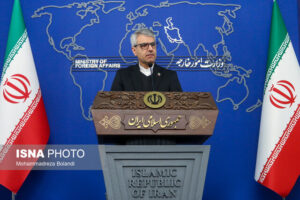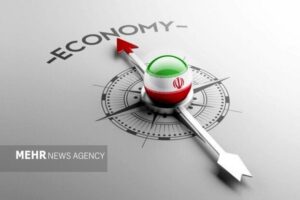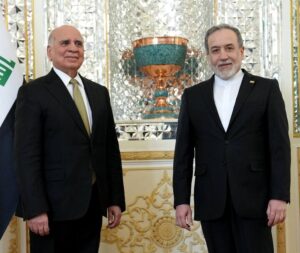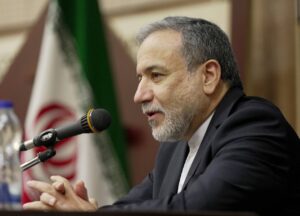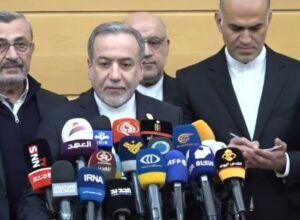According to ISNA, the text of the letter from Amir Saeed Iravani, Iran’s Permanent Representative to the United Nations, addressed to the President of the Security Council regarding the erroneous statements and misinterpretations by the U.S. Representative concerning Article 51 of the UN Charter, which was also sent to the UN Secretary-General, is as follows:
Referring to our previous communications dated 13, 16, 18, 19, 20, 21, and 23 June 2025, registered under numbers S/2025/379, S/2025/387, S/2025/388, S/2025/391, S/2025/401, S/2025/404, and S/2025/410, I hereby categorically reject and strongly condemn the claims made by the Representative of the United States during the Security Council meeting on 24 June 2025 under the agenda item “Non-proliferation” (meeting No. 9994). The U.S. Representative, in complete disregard of the fundamental principles of the UN Charter, made a desperate attempt to justify the unlawful U.S. use of force against the sovereignty and territorial integrity of the Islamic Republic of Iran, particularly the deliberate and unprovoked attack on Iran’s peaceful nuclear facilities on 21 June, as an act within the framework of self-defense under Article 51 of the Charter. She further stated that “nothing in the Statute of the International Atomic Energy Agency prevents states from taking legitimate actions in pursuit of individual or collective self-defense.”
In this regard, I wish to draw your attention and that of the Security Council members to the following points:
1. The justification provided by the United States lacks any legal basis and constitutes a blatant distortion of international law and the UN Charter. The unlawful use of force against the peaceful nuclear facilities of the Islamic Republic of Iran, which are under the full safeguards of the International Atomic Energy Agency (IAEA) and whose peaceful nature has been repeatedly verified, cannot under any circumstances be regarded as “the inherent right of self-defense” under Article 51 of the Charter. This arbitrary and self-serving interpretation of Article 51 is fundamentally inconsistent with the UN Charter, international law, and the jurisprudence of the International Court of Justice (ICJ). If such an illegal claim were to be normalized, one of the fundamental principles of the Charter, namely the prohibition of the use of force, would be severely undermined. According to UN General Assembly Resolution 3314, any preemptive use of force in the absence of an actual armed attack constitutes a clear act of aggression. In line with established legal principles and the ICJ’s jurisprudence—particularly in the cases of 1986 (Nicaragua v. United States) and 2003 (Oil Platforms, Islamic Republic of Iran v. United States)—the right to self-defense can only be invoked in response to an armed attack, and only if the conditions of “necessity” and “proportionality” are fully met.
2. The United States and the Israeli regime have sought to justify their aggressive actions by invoking the alleged nuclear threat attributed to Iran, a claim that lacks any credible legal or factual basis. The latest report by the IAEA Director General does not substantiate any violation of Iran’s safeguards obligations, nor does it document any diversion of nuclear materials. The report explicitly confirms that there is no evidence of a nuclear weapons program in Iran. Even the U.S. intelligence community has acknowledged this fact. Thus, invoking the so-called “imminent threat” lacks any legal validity within the framework of international law and the UN Charter. Furthermore, according to UN Security Council Resolution 487 (1981), the Council explicitly condemned attacks on nuclear facilities as a violation of the UN Charter. Similarly, numerous resolutions of the IAEA General Conference, including Resolutions GC(XXIX)/RES/444 and GC(XXXIV)/RES/533, unequivocally and unambiguously emphasize that any armed attack or threat of attack against nuclear facilities used for peaceful purposes constitutes a grave violation of international law and undermines the credibility and integrity of the IAEA and its safeguards and verification regime. Therefore, a fundamental question arises: if the unlawful and unilateral use of force can replace the IAEA’s safeguards mechanisms, what meaning would remain for the principles and functions of the safeguards regime?
3. Security Council Resolution 487 (1981), unanimously adopted on 19 June 1981 in response to the Israeli regime’s bombing of Iraq’s Osirak nuclear reactor, in several paragraphs, including “strongly condemns the military attack by [the Israeli regime], which is in clear violation of the Charter of the United Nations and the norms of international conduct,” and calls on the Israeli regime to “refrain in the future from any such acts or threats thereof.” The resolution also requests the Secretary-General to “keep the Security Council regularly informed of the status of the implementation of this resolution.” However, the United States, as a permanent member of the Security Council with the primary responsibility for maintaining international peace and security, has clearly violated a resolution it voted in favor of by deliberately attacking the peaceful and safeguarded nuclear facilities of the Islamic Republic of Iran, thereby undermining the credibility and authority of the Security Council.
4. The unlawful use of force and unprovoked armed attacks by the Israeli regime on 13 June 2025, followed by those of the United States, as a permanent member of the UN Security Council and a depositary state of the Treaty on the Non-Proliferation of Nuclear Weapons, against the peaceful nuclear facilities of the Islamic Republic of Iran, which are under comprehensive IAEA safeguards, under the pretext of self-defense, set a highly dangerous and deeply concerning precedent. This directly and severely undermines the authority of the Treaty on the Non-Proliferation of Nuclear Weapons, poses a grave and irreparable threat to the credibility and integrity of the non-proliferation regime as a whole, and creates a serious risk to international peace and security. Given such serious violations and their dangerous consequences, the United States’ invocation of Article 51 of the UN Charter to justify the aggressive actions carried out by the U.S. and the Israeli regime must be unequivocally and unambiguously rejected and condemned.
Therefore, the Islamic Republic of Iran once again requests the Security Council members to:
1. Explicitly and unambiguously reject the claim of “preemptive self-defense” by the United States and the Israeli regime, which lacks any legal basis and is merely a self-serving, arbitrary, and distorted interpretation of Article 51 of the UN Charter, inconsistent with international law;
2. Express the strongest possible condemnation of the unlawful use of force against the national sovereignty and territorial integrity of the Islamic Republic of Iran, including its peaceful nuclear facilities under safeguards, by the Israeli regime and the United States, as this constitutes a flagrant violation of Article 2(4) of the UN Charter, international law, Security Council Resolutions 2231 (2015) and 487 (1981), the IAEA Statute, and relevant resolutions of the IAEA General Conference.
Furthermore, the Islamic Republic of Iran once again requests the Secretary-General to:
1. Submit a report to the Security Council and all UN Member States on the status of the implementation of operative paragraph 2 of Security Council Resolution 487 (1981), particularly with regard to violations and the targeting of peaceful nuclear facilities and sites under IAEA safeguards by the Israeli regime.
It would be appreciated if this letter could be circulated as a document of the Security Council.


